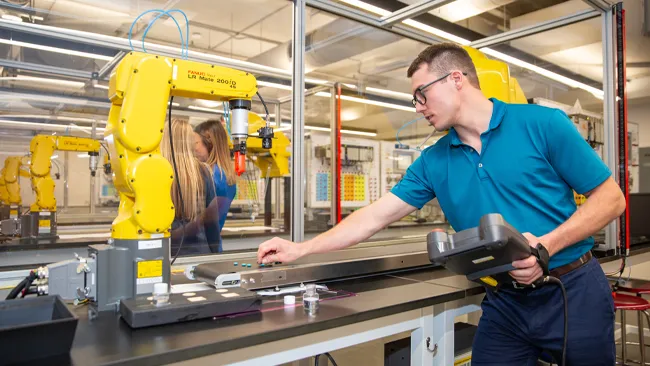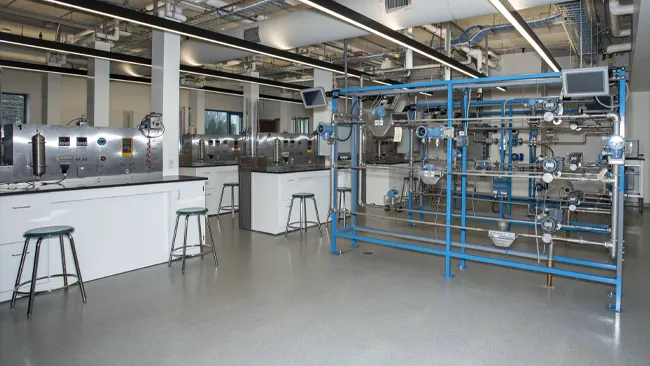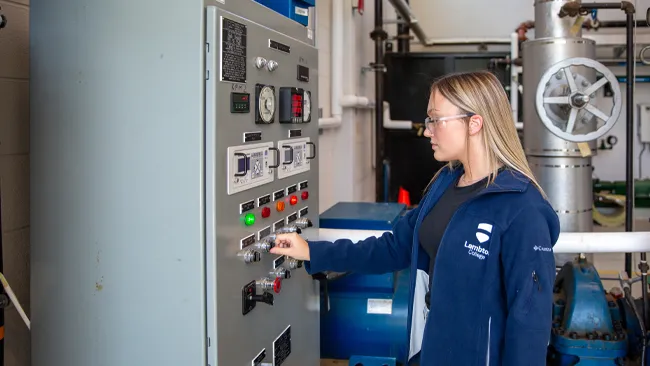
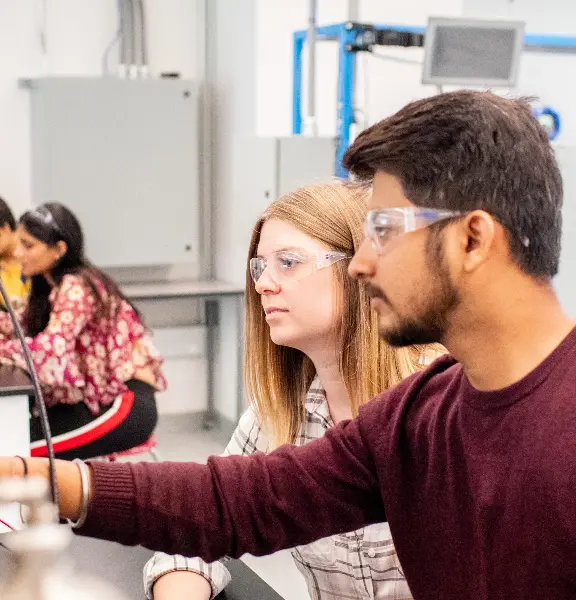
Advanced Industrial Systems & Automation
Overview
Design, implement, and maintain systems that streamline and optimize manufacturing processes using cutting-edge technology in the field of industrial systems and automation.
The Advanced Industrial Systems & Automation, two-year Ontario College Graduate Certificate is an innovative program that provides students with theory and technical hands-on knowledge to operate, maintain, calibrate, and troubleshoot various automation, robotics, and control systems to operate countless processes used in today’s modern Canadian industries.
The future of manufacturing operations is dynamic, and this program prepares university and college graduates for exciting careers in the scientific and technical aspects of machinery and industrial process operations. In the program, students gain specialized expertise and technical knowledge to build an in-depth understanding of automation variables (composition, temperature, pressure, level, density, mass, flow, proximity, acceleration, gyroscope, encoder) and control elements (valves, dampers, heaters, electric motors, conveyors, actuators, servo drives) used to maintain, modify, and optimize a variety of industrial automation processes.
Throughout this highly interactive program, students are introduced to the operation and interrelated automated systems tools used in industrial automation operations. As such, program curriculum focuses on relevant areas such as industrial automation and robotics, electronic devices and circuits, process control systems, programmable logic control, pneumatics, electro-pneumatics, hydraulics, electricity, electronics, and systems data communication. Students combine these core concepts with courses in professional workplace communication, lean production systems, industrial material design and sustainability, and Canadian workplace safety to build the skills necessary to be successful in today’s ever-changing manufacturing environment.
Sarnia - A Great Place to Study
Immerse yourself in Canadian culture in Sarnia's small community that cares.
Enjoy the beautiful city on the shores of Lake Huron, live affordably, and let us help you succeed in your future aspirations.
Admission Requirements
- Ontario College Diploma, Ontario College Advanced Diploma, Degree, or equivalent in Engineering Technology, Electrical Engineering, Computer Science, Information Technology, Physics, or a related discipline.
English Language Requirements
- IELTS of 6.5
- or -
- TOEFL iBT 79
- or -
- Passed Lambton Institute of English placement test
Meeting the minimum English requirements does not guarantee admission. Students with higher English proficiency scores will receive priority in the admission assessment process.
Costs
- Term 1 $9,412.26
- Term 2 $8,877.36
- Term 3 $9,337.34
- Term 4 $0.00
Total Cost of Program
Tuition fees are estimates and are subject to change each academic year. Fees do not include books (unless specifically noted), supplies or living costs.
Lambton College reserves the right to alter information including admission requirements and to cancel at any time a program or course; to change the location and/or term in which a program or course is offered; to change the program curriculum as necessary to meet current competencies or changes in the job market; to change the pathways third-party certification bodies; or to withdraw an offer of admission both prior to and after its acceptance by an applicant or student because of insufficient applications or registrations or over-acceptance of offers of admission. In the event Lambton College exercises such a right, Lambton College’s sole liability will be the return of monies paid by the applicant or student to Lambton College.
Additional Fees
Important Dates, Deadline & Late Fees
For additional information on registration dates, deadlines and late fees please refer to Registration Dates and Deadlines.
Student Fees
A student services fee is included in your tuition.
Health Insurance Coverage
Emergency medical insurance is mandatory for all international students at Lambton College. This includes students who are full-time and part-time and who are on a co-op. This insurance is provided by GuardMe - a third party insurance provider.
See Insurance Costs & DetailsTechnology Requirements
In order to keep pace with the requirements of each and every course in your program, Lambton College requires that each student have access to a laptop while studying at our college.
Labs & Equipment
Courses
Professional Communications
This course is designed for international students with diplomas or degrees. It focuses on polishing communications skills acquired through one's academic career and workplace experience. Through various business writing and speaking scenarios, students learn Canadian business practices and communication styles, incorporating inclusivity and diversity. Close attention is paid to proper incorporation of the intellectual property of others to ensure academic integrity. Students will practice organized and dynamic speaking and will strive for polished business documents.
Canadian Lean Production Systems
This course provides students with a practical understanding of Lean Production System as they develop continuous improvement skills. Opportunities to improve processes and systems including identification and elimination of waste, defining value, work measurement methods, and work analysis are provided. Topics including Value Stream Mapping, 5S, TPM and Visual Controls are also focused on.
Engineering Design for a Circular Economy - A Canadian Management Perspective
In this course, students delve into the economic activity that builds and rebuilds overall system health, both globally and more specifically from a unique Canadian manufacturing management perspective. The curriculum focuses on various models of bio-sustainability in the economy, and how these models effect management decisions. Biological materials and technical cycles are studied, as well as overall material and product design and re-design to better fit within a restorative economy.
Canadian Workplace Health & Safety
In providing an overview of Canadian Labour laws, workplace rules and regulations, and Health and Safety Hazards in the workplace, students gain an understanding of the responsibilities of employers, worker's rights as well as the responsibilities of various organizations in the Canadian labour industry. Awareness and recognition of various health and safety risks arising from a variety of occupations is also covered.
Electromechanical Measurement Instruments
Electric Circuits
Job Search & Success
This course provides student with skills and knowledge to help support their career search and succeed in the workplace. Students align their personal skill set and goals to guide them on their career paths. They will learn how to effectively conduct a job search, build a professional and well-tailored resume and cover letter, and develop and practice interview techniques. Students will also develop their personal brand to help support effective career networking and aid in their job search. Teamwork and collaboration in the workplace are also discussed. Self-reflection is used to inspire insight and support their professional career journey.
Computer Aided Design for Canadian Manufacturing (CAD/CAM)
Hydraulic & Pneumatic Systems
Electronic Devices & Circuits I
This course, intended for Instrumentation and Control Engineering Technology students, investigates the characteristics, basic circuits, and biasing techniques of semiconductor diodes, transistors, thyristors, and linear integrated circuits. Operational amplifiers are examined and various applications of Op-Amps to instrumentation and control are explored. The student's knowledge and understanding of electric circuits will grow through the use of lectures and labs.
Digital Logic
This course is designed to give technology students a thorough understanding of digital techniques and logic circuits, as applied to Industrial Control Circuits and to Processor Based Control Systems. Theory is presented in a two-hour weekly lecture schedule supported and supplemented by a two-hour weekly laboratory, which is designed to reinforce the lecture materials. The foundation of the course begins with a study of digital logic gates and functions and expands to include combinational and sequential logic, culminating with a study of the architecture and functioning of microprocessor based systems such as computers, programmable logic controllers (PLCs) and industrial control systems.
Control Systems
Microcontrollers & Embedded Systems
Electrical Machines: Principles, Application & Control
Programmable Logic Control
An integrated lecture/laboratory course where learners are introduced to the fundamentals of programmable logic control design. Applications of programmable logic controllers are stressed. This course will allow the learner to study control systems which use discrete components and continuous/analog systems operated in well defined sequential steps to bring about a desired result. Using the unique control features afforded by PLC's, and by judicious application of PLC fundamentals, the learner will also demonstrate an ability to bring process systems under control.
Human Machine & Robot Interfaces & Data Communication
Systems Automation
This course is an introduction to automation systems and robotics technology. Canada's robotics safety code will be examined and interpreted. Automation hardware components such as industrial robotic arms, tooling, controllers, teach pendants, industrial sensors, vision systems, conveyors and safety systems will be utilized. The programming of industrial robots to efficiently accomplish assignment objectives is an integral part of the course. Hands on lab exercises will permit students to illustrate their knowledge and competency in achieving a reliable solution to various automation objectives.
Emerging Technologies for Drones, Robots & Autonomous Vehicles
Co-op Work Term
Co-operative education provides students with the opportunity to apply classroom learning to the workplace, undertake career sampling and gain valuable work experience that may assist students in leveraging employment after graduation.
Contact
Centre for Global Engagement
LAMBTON COLLEGE SARNIA
1457 London Road
Sarnia ON N7S 6K4
After Graduation
Employment Opportunities
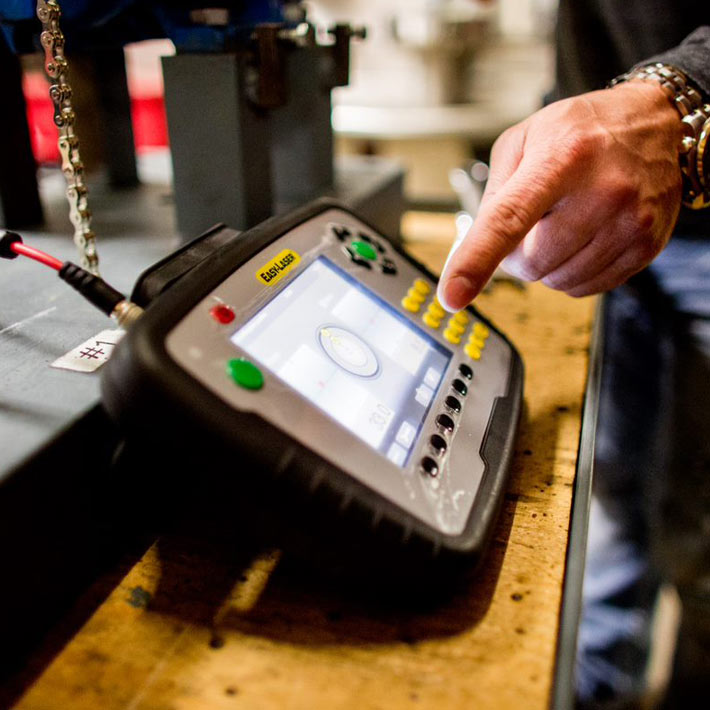
Graduates of the program may work in a variety of in-demand-careers in petrochemical, pharmaceutical, energy generation, nuclear power, mining, automobile assembly, food processing and advanced manufacturing industries. Some common employment titles may include industrial instrument technician, process control technician and automation technician.
Looking for Support After Graduation?
The International Graduate Services & Support Centre (GSSC) is a place dedicated to assisting International alumni as they seek employment and settle into Canadian life following graduation.
Post-Graduate Employment
International students who successfully complete their programs of study at Lambton College may be eligible to apply for a Post-Graduation Work Permit (PGWP) Program. This program allows students to gain valuable Canadian work experience.
A work permit under the PGWP may be issued for the length of the study program, up to a maximum of three years. A post-graduation work permit cannot be valid for longer than the student's study program, and the study program must be a minimum of eight months in length. The length and approval of the PGWP is determined solely by Immigration, Refugees and Citizenship Canada (IRCC).
Students must meet the eligibility requirements to apply for a post-graduation work permit.
Immigration Regulations & Changes
Immigration regulations are legislated by the Federal Government of Canada and are subject to change at any time without notice. Students are responsible for ensuring that they are in compliance with all Immigration, Refugees and Citizenship Canada regulations at all times during their studies and while in Canada. Lambton College staff are not authorized to provide advice or guidance on immigration-related matters. Prospective applicants and current students should consult the Immigration, Refugees and Citizenship Canada website or call the IRCC Call Centre at 1-888-242-2100 to answer or clarify any immigration-related questions or information.
Co-op
About Co-op
Students in this program have the opportunity to gain valuable work experience by applying classroom learning during co-op experiences.
Learn more about co-op terms and the roles and responsibilities of students and co-op advisors.
More Information
Women in Technology & Trades
Discover how Lambton College's Women in Technology & Trades (WiTT) group is empowering women to excel in technology and trades.
Visit our WiTT page for more information on mentorship opportunities, events, and resources designed to support your journey in these dynamic fields.
Learn More
Student Responsibilities
- Course and program delivery schedules are proposed and subject to change for each intake.
- Students are required to bring their own laptop with wireless capability.
- Students are advised to bring an official copy of their most recent police clearance, driver's license, and vaccination record from their home country.

Technology Requirements
It is recommended that students purchase a laptop with a Windows operating system.
Internet Speed Requirements
For best performance for students learning remotely, an internet connection with a minimum of 40 Mbps download and 10 Mbps upload speed is recommended in order to effectively use video conferencing and remote lecture delivery software as well as, other online resources remotely. Due to the large area over which students may be dispersed, we are unable to recommend a specific provider, so you will need to inquire around your area to find one that best suits your needs.
Minimum Laptop Requirements
In order to access the internet and virtually-delivered software and courseware, student laptops should include the following at a minimum. By meeting the following specifications, students will be equipped to access software and courseware on their laptop through the internet:
- Intel i5 8th Gen Processor or equivalent
- 16 GB of RAM (with a minimum of 8 GB)
- 100 GB HDD or more
- HD Graphics
- Webcam with a microphone
- Wireless 802.11n/ac 5ghz capable
- Windows Operating System (Windows 11)
Please note that Chromebooks and MacBooks may not support all software required for your program; students should verify compatibility with their professors.
Software
To ensure students are getting the most our of their classroom experience, some software will be required.
Lambton College has made this software easily accessible online. Students can leverage our Microsoft Office 365 software packages and services. In addition, much of the software you require for your courses will be available on demand for use on any device - on or off campus.



